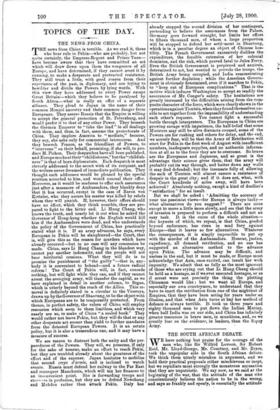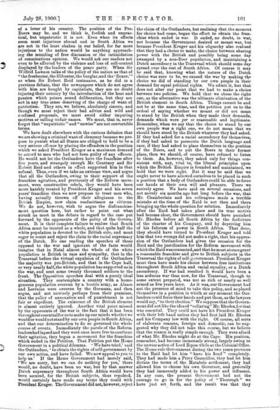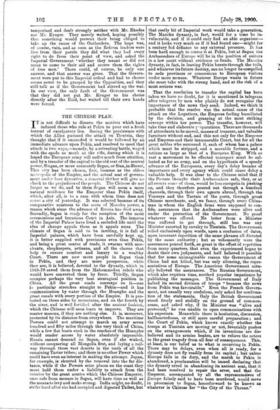THE SOUTH AFRICAN DEBATE.
WE have nothing but praise for the courage of the men who, like Sir Wilfrid Lawson, Sir Robert Reid, Mr. Lloyd-George, Mr. Courtney, and Mr. Bryce, took the unpopular side in the South African debate. We think them utterly mistaken in argument, and we hold their practical proposals either mischievous or inept, but we repudiate most strongly the monstrous accusation that they are unpatriotic. We say now, as we said at the beginning of the war, that the attitude of the man who conscientiously believes the nation to be in the wrong, and says so frankly and openly, is essentially the attitude of a lover of his country. The position of the Pro. Boers may be, and we think is, foolish and imprac- tical, but unpatriotic it is not. Even when its effects seem most injurious abroad and in South Africa we are not in the least shaken in our belief, for far more injurious to the nation would be anything approach- ing the muzzling of free discussion or the intimidation of conscientious opinion. We would ask our readers npt even to be affected by the violence and loss of self-control displayed by the leaders of the peace party. When Sir Wilfrid Lawson talks of the policy of the nation as that of "the freebooter, the filibuster, the burglar, and the 'Boxer," or when Sir Robert Reid insinuates, as he did in a _previous debate, that the newspapers which do not agree with him are bought by capitalists, they are no doubt injuring their country by the introduction of the heat and passion which poison sound deliberation, but they are not in any true sense deserving of the charge of want of patriotism. They are, we believe, absolutely sincere, and though we must reject their bad advice and wild and confused proposals, we must avoid either imputing motives or calling unfair names. We must, that is, never forget that "unpatriotic" and "unwise" are not convertible terms.
We have dealt elsewhere with the curious delusion that we are showing a criminal want of clemency because we pro- pose to punish what all States are obliged to hold to be a very serious offence by placing the offenders in the position which we asked President Kruger as a maximum demand to accord to men who had not been guilty of any offence. He would not let the Outlanders have the franchise after five years, and strangely enough Mr. Courtney and Sir Robert Reid and others in effect supported him in that refusal. Thus, even if we take an extreme view, and argue that all the Outlanders, owing to their support of the franchise agitation, and previously of the Reform move- ment, were constructive rebels, they would have been more harshly treated by President Kruger and his seven years' franchise than we now propose to treat men who, having actually thrown off their allegiance to the British Empire, now claim readmittance as citizens. We do not, however, wish to argue the disfranchise- ment question here, but rather to point out what struck us most in the debate in regard to the case put forward by the opponents of the policy of the Govern- ment. It is their complete failure to realise that South Africa must be treated as a whole, and that quite half the white population is devoted to the British side, and most eager to resist and reject the claim to the racial supremacy of the Dutch. No one reading the speeches of those opposed to the war and ignorant of the facts would imagine that in Natal almost the whole of the white population is British in race and sympathy, that in the Transvaal before the virtual expulsion of the Outlanders the majority was pro-British, and that in the Cape half, or very nearly half, the white population has supported us in the war, and sent some twenty thousand soldiers to the front. The Opposition speeches deal with a purely ideal situation, They contemplate a country with a homo- geneous population overrun by a hostile army, as Alsace and Lorraine were overrun by the Germans, and then argue, and not unwisely perhaps from their premises, that the policy of annexation and of punishment is not fair or expedient. The existence of the British element is almost entirely ignored. Another vital point missed by the opponents of the war is the fact that it has been throughoutessentialfor us to make up our minds whether we would or would not stand by our own people in South Africa, and that our determination to do so governed the whole course of events. Immediately the parole of the Reform leaders had lapsed and they were once more free to continue their agitation, they began a movement for the franchise which ended in the Petition. That Petition put the Home Government in a political dilemma. 'We have tried,' said the Outlanders, 'to obtain the rights of self-government by our own action, and have failed. We now appeal to you to help us.' If the Home Government had merely said, We are sorry, but we can do nothing for you,' there would, no doubt, have been no war, but by that answer Dutch supremacy throughout South Africa would have been secured, for the British subjects, thus repulsed, would certainly have made any terms they could with President Kruger. The Government did not, however, reject the claim of the Outlanders, but realising that the moment for choice had come, began the effort to obtain the fran- chise which ended in war. It ended, no doubt, in war, not because the Government desired or. meant war, but because President Kruger and his oligarchy also realised that they had a choice to make, the choice between sharing power with the British and possibly being some day swamped by a non-Boer population, and maintaining .a Dutch ascendency in the Transvaal which should some day spread over the rest of South Africa. Of course it may be said that, knowing what the nature of the Dutch choice was sure to be, we caused the war by making the choice we did of standing by our own people in their demand for equal political rights. We admit it, but that does not alter our point that we had to make a choice between two policies. We .hold that we chose the right one, as the alternative was the ultimate elimination of the British element in South Africa. Things cannot be and not be at the same time, and the petition put us to the ordeal of saying whether we meant or did not mean to stand by the British when they made their demands, demands which were per se reasonable and legitimate. Remember, when we say that the choice to stand by our own people was a right one, we do not mean that we should have stood by the British whatever they had asked. If they had asked for a racial ascendency for themselves, if they had asked to persecute the Dutch language and race, if they had asked, to place themselves in the position of the Boers, and to put the Boers in their former place, then we should, of course, have refused to listen to them. As, however, they asked only for things con- sistent with, nay, vital to, the liberal principles upon which the British Empire is founded and maintained, we hold that we were right. But it may be said that we ought never to have allowed ourselves to be placed in such a position that a body of Outlanders could be able to force our hands at their own will and pleasure. There we entirely agree. We have said on several occasions, and not merely six months ago but long before the war, that Mr. Chamberlain and his colleagues made a terrible mistake at the time of the Raid in not then and there bringing up the whole question for solution. Immediately after the Raid had taken place and its true motive had become clear, the Government should have punished Mr. Rhodes before all South Africa by the forfeiture of the charter of his Company, and by depriving him of his fulcrum of power in South Africa. That done, they should have turned to President Kruger and told him that two wrongs did not make a right, that his oppres- sion of the Outlanders had given the occasion for the Raid and the justification for the Reform movement with which the Raid was connected, and that he must at once grant a reasonable franchise and give to British subjects in the Transvaal the rights of self-government. President Kruger must then have made his choice between free institutions throughout South Africa and racial equality, or a Dutch ascendency. If war had resulted it would have been a less arduous war than now, for the Transvaal, though to some extent prepared, was not so rich or nearly so well armed as five years later. As it was, our Government had not the presence of mind to take this policy, and so placed themselves in a position in which at any moment the Out- landers could force their hands and put them, as the lawyers would say," to their election." We suppose that the Govern- ment did not like the idea of "collaring" Mr. Rhodes, for that was essential. They could not have hit President Kruger with their left hand unless they had first laid Mr. Rhodes and his Company low with the right. Of course, all sorts of elaborate reasons, foreign and domestic, can be sug- gested why they did not take this course, but we believe that the reason is really simple enough. They were afraid of what Mr. Rhodes might do at the Cape. His position, remember, had become immensely strong, largely owing to the unwise action of Lord Ripon while at the Colonial Office. The Home-rule Government during the two years previous to the Raid had let him " have his head" completely. They had made him a Privy Councillor, they had let him dictate the terms of the Matabele settlement, they had allowed him to choose his own Governor, and generally they had immensely added to his power and influence. In any case, the present Government had not the courage to go in for the policy of " Thorough " we have just set forth, and the result was that they temporised and dealt strongly neither with Mr. Rhodes nor Mr. Kruger. They merely waited, hoping possibly that something would prevent their being obliged to take up the cause of the Outlanders. The hope was, of course, vain, and as soon as the Reform leaders were free from their parole they did what they had every right to do from their point of view, and asked the Imperial Government whether they meant or did not mean to come to their aid and secure them the rights of free men.' There could, of course, be only one answer, and that answer was given. That the Govern- ment were put to this Imperial ordeal and had to choose seems never to be grasped by the Opposition, and they still talk as if the Government had stirred up the war. In our view, the only fault of the Government was that they did not put Mr. Kruger to his choice directly after the Raid, but waited till their own hands were forced.




































 Previous page
Previous page